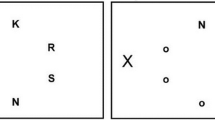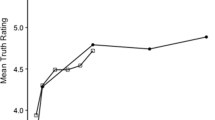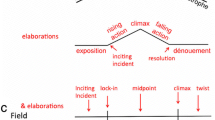Summary
A randomness concept hypothesis of repetition avoidance in socalled ‘randomization’ tasks was studied. The alternative hypothesis proposed is the control hypothesis, which claims that repetition avoidance is caused by the attempts of the subjects to avoid perseveration. Three sequential response production tasks (number randomization, tone randomization, and production of a pleasing tone sequence), one randomness-judgement task, and four perseveration measures were presented to the subjects. Repetition avoidance was found in all three production tasks, including the tone productions in the ‘pleasing’ condition. Correlations of the randomness judgements with repetition avoidance were generally not found. There was only slight evidence of correlations between the perseveration measures and repetition avoidance. The results suggest that randomness concepts do not contribute to repetition avoidance to any great extent. The control hypothesis is proposed to explain the results.
Similar content being viewed by others
References
Bakan P (1960) Response tendencies in attempts to generate random binary sequences. Am J Psychol 73:127–131
Breidt R (1973) Lassen sich Perseverationen durch Hirnschädigungen erklären? Psychiat Clin 6:357–369
Chapanis A (1953) Random-number guessing behavior. Am Psychol 8:332
Guilford JP (1959) Personality. McGraw-Hill, London
Kuhl J, Schönpflug W (1974) Ordnungsverhalten, Lärmbelastung und Persönlichkeit. Psychol Res 37:143–176
Lincoln RS, Alexander LT (1955) Preferred patterns of motor and verbal responses. J Exp Psychol 50:106–112
Mittenecker E (1953) Perseveration und Persönlichkeit, 1. Teil: Experimentelle Untersuchungen. Z Exp Angew Psychol 1:5–31
Mittenecker E (1958) Die Analyse ‘zufälliger’ Reaktionsfolgen. Zeitschr Exp Angew Psychol 5:45–60
Rath GJ (1966) Randomization by humans. Amer J Psychol 79:97–103
Ross BM (1955) Randomization of a binary series. Amer J Psychol 68:136–138
Tellegen B (1968) Over rigiditeit (On rigidity) Doctoral dissertation, University of Utrecht
Teraoka T (1963) Some serial properties of subjective randomness. Jap Psychol Res 5:120–128
Truijens CL, Trumbo DA, Wagenaar WA (1976) Amphetamine and barbiturate effects on two tasks performed singly and in combination. Acta Psychol 40:233–244
Tune GS (1964) A brief survey of variables that influence random generation. Percept Mot Skills 18:705–710
Wagenaar WA (1970a) Subjective randomness and the capacity to generate information. Acta Psychol 33:233–242
Wagenaar WA (1970b) Appreciation of conditional probabilities in binary sequences. Acta Psychol 34:348–356
Wagenaar WA (1971) Serial non-randomness as a function of duration and monotony of a randomization task. Acta Psychol 35:78–87
Wagenaar WA (1972) Sequential response bias. Doctoral dissertation, Soesterberg, The Netherlands
Weiss RL (1965) Variables that influence random generation: an alternative hypothesis. Percept Mot Skills 20:307–310
Wiegersma S (1982) A control theory of sequential response production. Psychol Res 44 (same issue)
Yavuz HS (1963) The production of random letter sequences in schizophrenics. J Psychol 56:171–173
Zwaan EJ (1964) De afhankelijkheid van successieve antwoorden in diverse gedragssituaties. Ned Tijdschr Psychol 29:328–340
Author information
Authors and Affiliations
Rights and permissions
About this article
Cite this article
Wiegersma, S. Can repetition avoidance in randomization be explained by randomness concepts?. Psychol. Res 44, 189–198 (1982). https://doi.org/10.1007/BF00308450
Received:
Issue Date:
DOI: https://doi.org/10.1007/BF00308450




